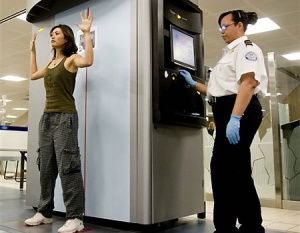Health risk of body scanners more likely to kill than terrorist bomb

Airplane passengers are statistically as likely to be killed by full-body scanner as a terrorist’s bomb, according to a leading US scientist.
The machines, which have been introduced at major airports around the world, have raised fears that the increased exposure to harmful radiation may cause cancer.
Peter Rez, from Arizona State University, said the probability of dying from radiation from a body scanner and that of being killed in a terror attack are both about one in 30 million.
He also warned that a potential malfunction could increase the radiation dose.
He said: “The thing that worries me the most, is not what happens if the machine works as advertised, but what happens if it doesn’t.”
ADVERTISEMENT
Rez formed his conclusions by studying the radiation doses emitted by the scanners using the images produced by the machines. He discovered that the radiation dose was often higher than the manufacturers claimed.
He also that the statistical coincidence means that there is really no case to be made for deploying any kind of body-scanning machine - the risk is identical.
But he added: “They’re both incredibly unlikely events. These are still a factor of 10 lower than the probability of dying in any one year from being struck by lightning in the United States.”
Biochemist John Sedat from the University of California has also supported Rez’s argument, saying most of the energy from the scanners is delivered to the skin and underlying tissue.
“While the dose would be safe if it were distributed throughout the volume of the entire body, the dose to the skin may be dangerously high,” they wrote.
The Office of Science and Technology responded to Rez’s report and said the scanners have been “tested extensively” and meet safety standards.
Dr David Brenner, head of Columbia University’s centre for radiological research, said children and passengers with gene mutations - around one in 20 of the population - are more at risk as they are less able to repair X-ray damage to their DNA.
The Civil Aviation Authority, Department for Transport and Health Protection Agency said that the technology is safe and say their tests show it would take 5,000 trips through the scanner to equal the dose of a single chest X-ray.
They add that given climate of high security, it is essential that security staff use “all means possible” to minimise risks to airline security.
The CAA said: “The device has been approved for use within the UK by the Department for Transport and has been subjected to risk assessments from the Health Protection Agency.

